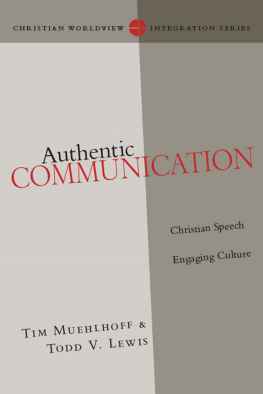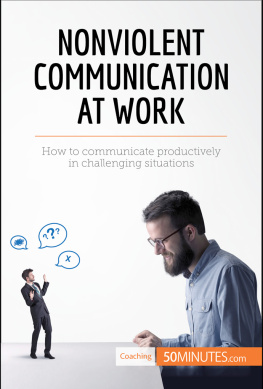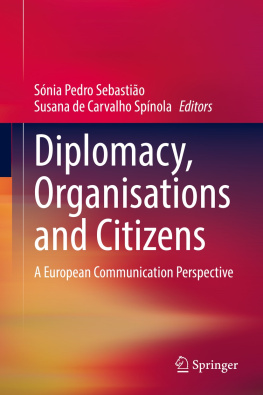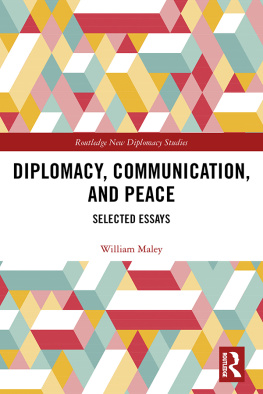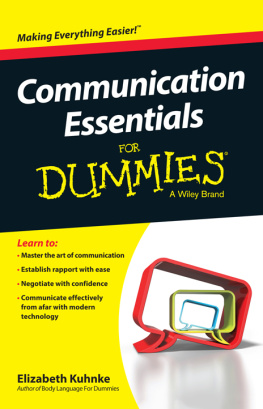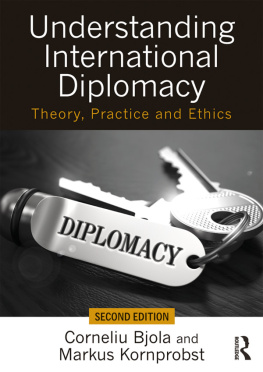Diplomacy Cause and Effect
The Art of Communication
Gordon Gatherer
Copyright 2020 Gordon Gatherer
All rights reserved
First Edition
Fulton Books, Inc.
Meadville, PA
Published by Fulton Books 2020
ISBN 978-1-64654-173-7 (paperback)
ISBN 978-1-64654-174-4 (digital)
Printed in the United States of America
Table of Contents
I wish to thank my friends and family who supported me and gave me the courage and strength to follow my dreams and share my gifts with the world.
I dedicate this book as my way of being a positive influence in this world and contributing to the growth and development of peopleyoung and oldfrom all walks of life.
Long live the power of diplomacy. Let it bring mankind to a level of peace, brotherhood, and humanity.
Special thanks to Pastors Vincent and Jennifer Miller for giving me the chance to be who I am and who paved a road of honor and integrity for me to follow. I love you both.
Prologue
T he human experience is, in my opinion, the most fascinating, profound, and powerful of all encounters. What people say, what they feel, how they think, what they do to each other can literally alter the course of history and time. This gift, this special gift we have been given, to think and talk and change a thought or influence a mind just by the words we say or the things we do.
If you walk into a bank and rob it, causing harm to other people, you have created a dark hole in the arena of time and space. If in this moment, you take a life or do damage to something or someone, you have shifted the course of time and created a chain of events that will define and burn this moment in the history of our lives.
Those who will hear your name or see you will have contempt for your changing the flow of their lives, causing anger and pain, not joy and positive energy.
If you rush into a burning building and save the life of a child, you have also caused the same shift in time and space. This is a positive shift. People are happy, grateful, proud to know you, and inspired by your action.
When two leaders talk and their feelings are not understood or expressed correctly, it could have a negative effect on their relationship even to the brink of conflict, civil unrest, or evenwar.
Communication, negotiation, understanding, compassion, respect, tolerance, and honesty are the elements that allow the concept of diplomacy to exist and function successfully in this society.
This book is a collection of thoughts, theories, experiences, and situations that I have encountered. I have walked through many doors in my lifealmost as many as there are stars in the sky.
My journey has given me the chance to embrace the energy of the universe and the ultimate knowledge and wisdom that exist in understanding the power of diplomacy and the art of communication.
Chapter One
Diplomacy: Concept Elements
D iplomacy, according to the textbook definition, is the art of negotiation.
This could be between two people, two businesses, or two nations.
It is a simple definition, but in my opinion, diplomacy is all but simple. There are so many factors involved in establishing an effective and productive level of diplomacy.
I think that the concept of diplomacy has certain basic elements that should exist in order for it to be effective.
- Communication: This is the most important aspect. To be able to sit down with someone and discuss issues or concerns calmly, reasonably, with an open mind and a positive attitude is key. This is necessary for developing solutions and agreements that both parties find fair and honest.
- Information: Whatever the issue is between two parties, it should be well thought out, planned, and researched. This way, they are on the same page. They can share and discuss things clearly and accurately.
- Self-awareness: Each individual should have a clear and honest view of themselves, their concerns, their strengths and weaknesses and an awareness of their abilities to negotiate and communicate openly and successfully.
- Respect for the power of words: Words are the most powerful form of communication. What you say, when you say it, and how you say it could mean the difference between camaraderie or confrontation. This aspect is most felt in the political arena. World leaders and politicians make statements and opinions and promises that influence people to support their campaign or not.
In some cases, people use fear and intimidation as a means of diplomacy. They use it as a way of manipulating guidelines that we integrate into our cultures and our existence.
- Eye contact: Speak directly to someone. Look into their eyes and communicate your energy to them. People say more with their eyes than with their mouths. Shake hands firmly and confidently when meeting someone. Say who you are and be positive about meeting the person.
- Let a person finish talking and dont interrupt. Give the person that window so they can complete their thoughts. Even if you think they have finished, they may have something else to add.
Give that ten-second window before you respond. This way, you can absorb what was said then decide how to respond.
Sometimes certain things dont need a response. A simple nod or a gesture or a smile can be enough. Thats interesting, I didnt know that, Thanks for the information, Im curious about that, Can you explain furtherthese phrases can be adequate responses that can keep a conversation balanced and leaves room to either continue it or finish it. Sometimes, people are quick to talk and add things into a conversation that may not be necessary, or they just want to get their point across.
When you communicate with someone, you should always be on the lookout to learn something new.
Here are some basic elements which I think will help in being a successful diplomat.
- Tell the truth: Always be honest in your approach. Say what you mean and say it from the heart with a universal approachnot an attack or judgment.
- Be humble: If you are not clear on something or not certain, ask questions and offer an open floor to share thoughts and clarify points of interest.
- Never underestimate or overestimate anyone or anything. Do not assume anything. Find out the complete version of an issue from all sides.
- Be tolerant of all people, all opinions, and all circumstances.
- Do not criticize any idea, opinion, or comment. Agree to disagree but respect each persons right to their thoughts .
- Try to use as many positive words and phrases as possible like we, collective, cooperation, together, equal, I understand, I have another way to look at it, lets find the best solution. Create an atmosphere of hope and progress.
- Speak calmly clearly and with a pleasant tone. Yelling and arguing are ineffective because, for the most part, what is being said is not really being heard.
I was trying to tell someone something. I agreed with this person and even tried to offer an apology if I was off the track, but this persons reaction was so aggressive and a little stupid because I was agreeing. The actual response was What do you mean you agreeagree to what? This person didnt even hear what I was saying .
You see how this aggressive approach can destroy any chance of communication. I have seen this simple action ruin so many situations and even relationships.
- Listen: Take a moment to listen to what is being said and not react to what is being said. Give yourself that ten-second window to absorb and prepare your response so it is conducive to the situation and not diverting the real issue .



